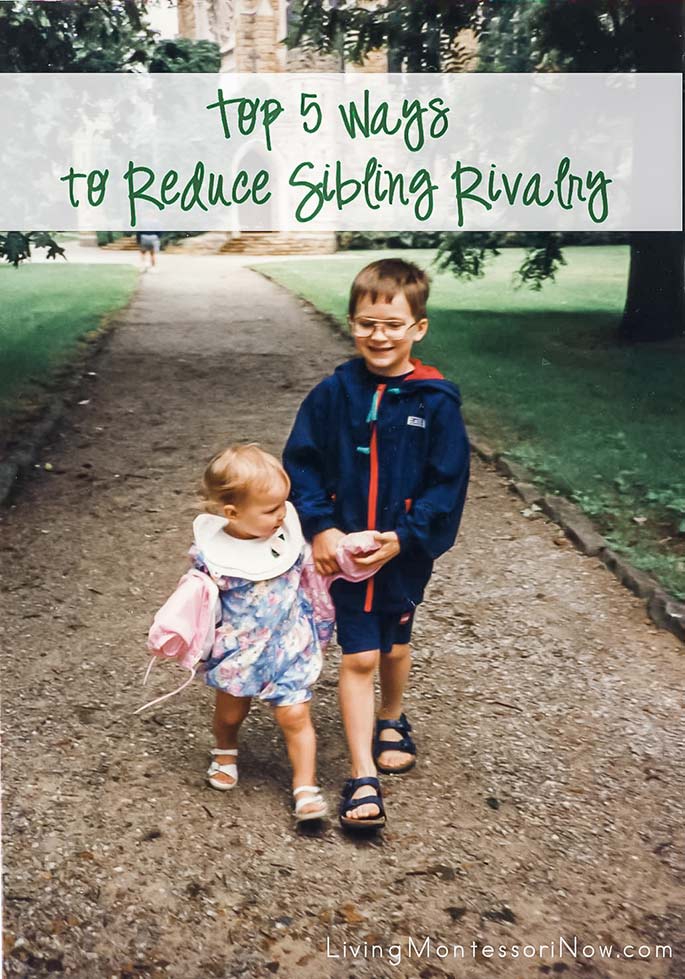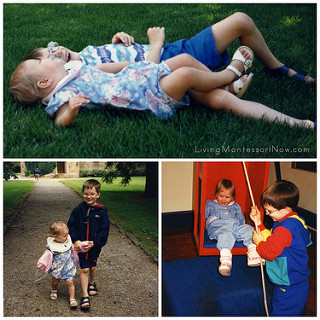My husband and I were lucky … our two kids were the best of friends even though they were born 5 years and 2 days apart. Of course, we had a number of factors that don’t apply to every family.
For one thing, the five year age difference probably automatically reduced sibling rivalry because our kids weren’t direct competitors. And the fact that they were opposite sexes probably made a difference, too … again because they weren’t direct competitors. Will and Christina were also homeschooled and spent lots of time together, which encouraged them to become best friends.
Those factors are part of our unique family, but there are a number of ideas any family can use to reduce sibling rivalry. I have a post at Bits of Positivity (formerly called Raising Figure Skaters) about “How to Help Each of Your Children Feel Special.” I think all the ideas in that post are ones that can help reduce sibling rivalry.
I especially like to remember this quote when it comes to siblings:
“Fairness does not mean everyone gets the same. Fairness means everyone gets what they need.” – Rick Riordan, The Red Pyramid
Here are some ideas for helping your kids get along condensed into my top 5 ways to reduce sibling rivalry.
1. Focus on meeting each child’s needs and interests.
This can include many things … from following each child’s unique interests to making sure you’re giving affection to each child. In my “Top 10 Montessori Principles for Natural Learning,” I list “follow the child” as the number one Montessori principle.
2. Learn to fully appreciate each child’s unique personality and gifts.
You’ll be much more likely to meet each child’s needs and interests if you appreciate each child’s unique personality and gifts. I really recommend learning everything you can about personality types. You’ll find more information about personality types in my “How to Help Each Child Feel Special” post.
My husband and I are aware of the personality types of our siblings, kids, and kids-in-law. We rejoice in the diversity of talents and unique additions each brings to our family. Our kids and kids-in-law are all aware of the unique personality types within our family as well.
3. Help your children feel they’re on the same team.

Will and Christina Skating Pairs in 2000
My kids actually were on the same team. When our family belonged to a roller skating dance club when Will was 10 and Christina was 5, Will and Christina decided they wanted to compete in roller skating. So they became a roller-skating dance team. Will went to Roller Skating Nationals in singles and Christina in solo dance, but they were also able to go to Roller Skating Nationals as a dance team. When they started figure skating at ages 11 and 6, they wanted to start skating as a pair team. They competed in pairs together and were able to win two national medals and even compete at an international competition in Canada together.
We taught Will and Christina as a team to support each other and not criticize the other if one of them made a mistake. That served them both well when Christina decided to focus solely on ice dance at age 12 (which was good because within a year she was too tall for pairs). When Christina went into ice dance, Will found a new pair partner, and Christina found a dance partner. Their experiences working together as a skating team helped them become good, supportive partners in other team situations.
(Side note: Will and Christina even competed together in ice dance a few years and were able to go to Junior Nationals together in that, too. Will was never actually interested in ice dance, but he enjoyed helping Christina and found that ice dance helped his artistry for pairs.)
Your children might not have the opportunity to be literally on the same team in the way that mine were, but it’s helpful whenever your kids can feel that they’re working together toward a common goal.
For many children, it will help to play cooperative games unless your children truly enjoy competitive games. We played cooperative games when our kids were little until they requested competitive games or activities. Their competitive ski racing and competitive skating activities came from their requests, not ours. I’m always amazed at how happily my family can play board games or any competitive games together, and I think it helped that my kids weren’t forced into competition. I have a post on “How to Use Cooperative Games to Teach Sportsmanship” with ideas that can be used at a number of ages.
4. Do as many family activities together as possible.
Doing things together encourages togetherness. Our family did lots of homeschooling activities and traveling for figure skating competitions together. We had a family night every week where we went to a movie or watched a video together. We also did lots of skiing as a family.
5. Learn communication skills that will help you and your children talk about feelings.
I think this is essential for any family. For some families, it helps to have regular family meetings. We didn’t have regular family meetings, but we always talked about any important issues that affected our kids. Our children learned to be kind to each other and honest with both us and each other. They learned techniques for communicating openly and honestly. Here are some posts about ideas that worked for my family along with Montessori ideas that work in many types of schools and families:
- “How We Used Gentle Discipline in Our Homeschool”
- “Grace and Courtesy Games at Home or School”
- “Montessori-Inspired Peace Education Activities”
I’m happy to say that my two kids at 23 and 28 still get along very well … in fact, my kids and kids-in-law even bought a 3-story house and all live together peacefully. They know how to communicate their feelings when issues arise. But most important, they all love … and like … each other.
Do you have a favorite way to reduce sibling rivalry in your family?
If this is your first time visiting Living Montessori Now, welcome! If you haven’t already, please join us on our Living Montessori Now Facebook page where you’ll find a Free Printable of the Day and lots of inspiration and ideas for parenting and teaching! And please follow me on Instagram, Pinterest (lots of Montessori-, holiday-, and theme-related boards), and YouTube. While you’re here, please check out the Living Montessori Now shop.
And don’t forget one of the best ways to follow me by signing up for my weekly newsletter. You’ll receive some awesome freebies in the process!










These are such helpful tips. My boys are 20 months apart. They are pretty good friends but they fight a lot too. Now that my oldest is headed off to kindergarten, I’m really going to work on having planned family time like you mention. I don’t want them to lose the special bond they’ve developed by being at home together for as long as they’ve remembered. I love hearing about how your kids are still good friends even as adults, what a blessing!
Thanks, Jackie! Our kids still talk fondly about our family night … family night really was a time we all treasured. 🙂
Why didn’t I know that your kids live together?! That is amazing. My sisters and I have talked about living together, but I think we’re not quite ready to take that plunge yet 😉 Love all of your ideas, as always, Deb. As a homeschooling family, I *love* the fact that we spend so much time together – I only wish my husband could be with us, too. Right now I’m with Kieran and Ailia on a 3 week vacation, most of which we are without Tom. We are learning so much about how to get along in tight spaces, and I’m learning how to be a more patient mama. It’s been so good!
Thanks so much, Dionna! We were especially lucky that my husband has worked out of our home for years, so we even had more family time than most homeschoolers.
Your vacation sounds wonderful! 🙂
I do think being together so much brings the kids closer together. My kids are very close. They are also all 4 years apart – so they are not in direct competition for toys – and are in different stages in life. I also believe that helps a lot as well.
Very good points. Thanks so much for this post.
Thanks, Lisa! It’s nice that your kids are close, too … so much fun that way! 🙂
I love that quote on fairness! That’s how I feel about how I was raised and how I want to raise my kids — we parent to each child, not by some outside standard.
It’s so interesting to hear more of how your family has come to where it is. I didn’t know all that about their pairs and then ice dancing background — very cool. It’s also interesting that they chose competition for themselves; it definitely sounds like they have a healthy attitude about it.
Your family sounds so warm and close. Love that your kids and their spouses live together now!
Thanks for your kind comment, Lauren! Motherhood has definitely been … and continues to be … a fun adventure!
Thank you for these insights! What’s helped in our home is making sure that I get regular one-on-one time with each child, which requires some planning when it comes to my older boy.
Thanks for your comment, Rachael! I know that works very well for many families. I was able to spend lots of one-on-one time with my daughter in England, which gave us an extra-close bond. 🙂
I love hearing your perspective as a mother whose children are grown now and your reflections on how their childhood sibling relationship has unfolded. I love #5. I think your’re right; communication is really really important and its kind of this amazing but overlooked tool. But I also love the Montessori peace education resources you gave. Montessori cared about peace education and I think she had some great wisdom on the topic.
Thanks, Brittany! I really love the Montessori peace-education activities, too. They’re great for fostering positive communication. 🙂
I really love all of the items you bring up, and I can see how I can use some of these thoughts to apply to even a single child. I grew up one of three, each spaced about 2.5-3 years apart. It was hectic, with some heavy sibling rivalry. Hopefully I’ll be blessed to have another. Your family seems so picturesque and peaceful. I definitely strive to make it there : )
Thanks for your kind comment, Ana! It’s so true that many of the ideas would apply to a single-child family as well. 🙂
I love that your kids are still such good friends. I can’t imagine sharing a house with my brother and his wife! It seems like they accomplished more together than they ever would have separately.
Thanks for your sweet comment, Alisha! My kids have definitely been able to do more by working together. 🙂
Thank you for the tips. Mine are close in age so I need all the help I can get.
Your kids are adorable!
Thanks for your kind words, Lorie! I hope some of the ideas are helpful for your family. 🙂
Great tips! In addition to being a blogger, I work in the counseling field as well. Educating other people about the importance of building relationships and tips to reduce things such as sibling riverary. Found you via Cheerios and Lattes link up.
Thanks so much, Aimee! That’s definitely an important area of work. 🙂
Some more tips to add to above.
Encourage helping one another in their work. Encourage the older one teach something to the younger one. Sometimes, I get my older child feed the younger one and they enjoy that a lot. Play games where there is an opportunity to take turns.
Thank you for posting this article! I am a Counselor and have an Adlerian theory background. A five year age difference and being opposite sexes definitely would reduce sibling rivalry. All of your points were wonderful. I especially liked how you discussed teaching children to support each other and not to criticize.
hmm, very nice post, and good tips . really apperciated
What a great article! Thank you. So much of it comes down to the attention and mindfulness we spend actually making sure we treat both children the way we would want to be treated, and remembering we as parents never stop being one of the most important people in the lives of our children, regardless of their age and birth order.